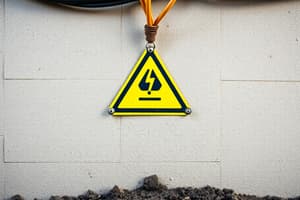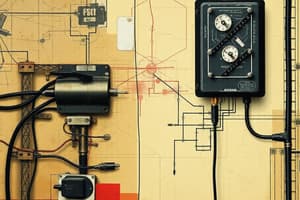Podcast
Questions and Answers
What is the demand factor for the portion of lighting load from 3001 to 120,000 volt-amperes for dwelling units?
What is the demand factor for the portion of lighting load from 3001 to 120,000 volt-amperes for dwelling units?
- 50%
- 35% (correct)
- 25%
- 100%
What is the calculated load for each small appliance branch circuit in a dwelling unit?
What is the calculated load for each small appliance branch circuit in a dwelling unit?
- 1500 volt-amperes (correct)
- 2000 volt-amperes
- 1800 volt-amperes
- 1200 volt-amperes
What percentage of the full-load current rating of the highest motor needs to be added when calculating ampacity for motors and other loads?
What percentage of the full-load current rating of the highest motor needs to be added when calculating ampacity for motors and other loads?
- 125% (correct)
- 150%
- 100%
- 200%
What is the minimum load to be included for each laundry branch circuit installed in a dwelling unit?
What is the minimum load to be included for each laundry branch circuit installed in a dwelling unit?
Which of the following statements is true regarding the calculation of motor loads?
Which of the following statements is true regarding the calculation of motor loads?
What is the primary focus of electrical engineering?
What is the primary focus of electrical engineering?
Which of the following is NOT a responsibility of electrical engineers?
Which of the following is NOT a responsibility of electrical engineers?
What is required for practicing engineers in electrical engineering as per RA 7920?
What is required for practicing engineers in electrical engineering as per RA 7920?
Which of the following tasks does electrical engineering NOT typically involve?
Which of the following tasks does electrical engineering NOT typically involve?
Which of the following best describes electricity?
Which of the following best describes electricity?
Which area is NOT typically covered by the practice of electrical engineering?
Which area is NOT typically covered by the practice of electrical engineering?
What type of engineering knowledge is essential for the sale and distribution of electrical equipment?
What type of engineering knowledge is essential for the sale and distribution of electrical equipment?
What are the primary effects of electricity?
What are the primary effects of electricity?
What is the primary purpose of a plain tap joint in electrical wiring?
What is the primary purpose of a plain tap joint in electrical wiring?
Which joint is considered the most widely used splice in interior wiring installations?
Which joint is considered the most widely used splice in interior wiring installations?
What type of joint is best suited for connecting a small-diameter wire to a larger diameter wire in a lighting fixture?
What type of joint is best suited for connecting a small-diameter wire to a larger diameter wire in a lighting fixture?
What is the purpose of the Western Union Long Tie splice?
What is the purpose of the Western Union Long Tie splice?
Which joint can be used when the heavy tap wire cannot easily wrap around the main wire?
Which joint can be used when the heavy tap wire cannot easily wrap around the main wire?
What kind of splice is the split bolt splice primarily used for?
What kind of splice is the split bolt splice primarily used for?
Which connector is used to replace the rattail joint splice?
Which connector is used to replace the rattail joint splice?
What do service conductors do in an electrical wiring system?
What do service conductors do in an electrical wiring system?
How is the labor cost for electrical plan design estimated?
How is the labor cost for electrical plan design estimated?
What determines the quantity of conduits needed for an electrical plan?
What determines the quantity of conduits needed for an electrical plan?
What is the total length of ungrounded wires based on the provided formula?
What is the total length of ungrounded wires based on the provided formula?
How are the quantities of utility boxes determined in an electrical plan?
How are the quantities of utility boxes determined in an electrical plan?
What is the quantity of adapters in relation to locknuts and bushings?
What is the quantity of adapters in relation to locknuts and bushings?
What is the minimum size of equipment grounding conductor for a circuit with a 20 ampere overcurrent protection?
What is the minimum size of equipment grounding conductor for a circuit with a 20 ampere overcurrent protection?
For a grounding electrode conductor size, what is the correct size for a service entrance conductor that is 60 mm2?
For a grounding electrode conductor size, what is the correct size for a service entrance conductor that is 60 mm2?
When calculating the size of service entrance conductors, what additional percentage is added for the largest motor's full load amperage?
When calculating the size of service entrance conductors, what additional percentage is added for the largest motor's full load amperage?
What is the minimum size grounding conductor required for a service entrance conductor greater than 175 mm2 but not exceeding 325 mm2?
What is the minimum size grounding conductor required for a service entrance conductor greater than 175 mm2 but not exceeding 325 mm2?
What is the total size of service equipment required for a circuit with a 40 ampere motor protective device and two additional branch circuits rated at 15 amps each?
What is the total size of service equipment required for a circuit with a 40 ampere motor protective device and two additional branch circuits rated at 15 amps each?
Which of the following sizes is NOT a minimum size for equipment grounding conductors based on the settings of overcurrent devices?
Which of the following sizes is NOT a minimum size for equipment grounding conductors based on the settings of overcurrent devices?
What is the minimum grounding electrode conductor size for a service entrance conductor that is rated at 38 mm2?
What is the minimum grounding electrode conductor size for a service entrance conductor that is rated at 38 mm2?
If there is a continuous load of 10 amperes in addition to the largest motor FLA of 20 amperes, how should you calculate the size of the service entrance conductors?
If there is a continuous load of 10 amperes in addition to the largest motor FLA of 20 amperes, how should you calculate the size of the service entrance conductors?
Flashcards are hidden until you start studying
Study Notes
Electrical Engineering Overview
- Discipline focused on electricity, electronics, and magnetism.
- Involves study, design, and application of electric systems and devices.
- Promotes electrical safety and the optimization of technology.
Professional Requirements
- Practicing electrical engineers must hold a degree in electrical engineering.
- Certification from Professional Regulation Commission (PRC) is mandatory.
- Membership in the Institute or Integrated Electrical Engineers is required by RA 7920.
Areas of Practice in Electrical Engineering
- Consultancy: Offering expert advice and investigation.
- Design: Preparing plans and specifications for electrical systems.
- Construction: Overseeing the installation and commissioning of electrical power systems.
- Management: Supervising operations and maintenance of equipment.
- Manufacturing: Engaging in production and repair of electrical devices.
- Education: Teaching electrical engineering concepts and practices.
- Sales: Managing the distribution of electrical equipment and systems.
Introduction to Electricity
- Electricity is energy generated through friction, induction, or chemical change.
- It has magnetic, chemical, and radiant effects.
Electrical Wiring Splices and Joints
- Plain Tap Joint: Used for tap wires under tension.
- Aerial Tap: Temporary tap used at construction sites.
- Duplex Cross Joint: Joins two tap wires simultaneously for heavy stress.
- Western Union Splices: Widely used for extending wire lengths in both interior and exterior applications.
- Fixture Joint: Connects smaller wires to larger circuits.
- Knotted Tap Joint: Simplistic tap with limited strain resistance.
Electrical House Wiring Systems
- Service: Conductors delivering electric energy from utility to premises.
- Service Conductor: Links service point to disconnecting means, not counted for branch circuits for illumination.
Load Calculations
- Small Appliance Circuit Load: Calculated at 1500 volt-amperes for each circuit in a dwelling unit.
- Load Factors: Vary based on occupancy type and total demand.
Motor Loads and Grounding
- Motor loads calculated at 125% of the highest full-load current plus others in the circuit.
- Ampacity requires various minimum sizes for equipment grounding conductors based on overcurrent device ratings.
Comprehensive Designing Measures
- Service Entrance Conductors: Sized by summing computed load, largest motor FLA, and 25% of continuous load.
- Electrical Plan Estimates: Include calculations for materials and labor costs associated with the installation.
Computation for Estimates
- Labor is typically estimated at 20-30% of total material costs.
- The quantity of conduits and wires is derived from overall lengths needed for the project.
- Estimations for junction boxes, circuit breakers, and other components are calculated based on site-specific requirements.
Wiring and Conductor Guidelines
- Ground wire is green/white.
- Conductors must be sized correctly to ensure safety and efficiency.
These notes summarize the key aspects of electrical engineering as required for operation and maintenance safety standards, highlighting both theoretical knowledge and practical applications.
Studying That Suits You
Use AI to generate personalized quizzes and flashcards to suit your learning preferences.





